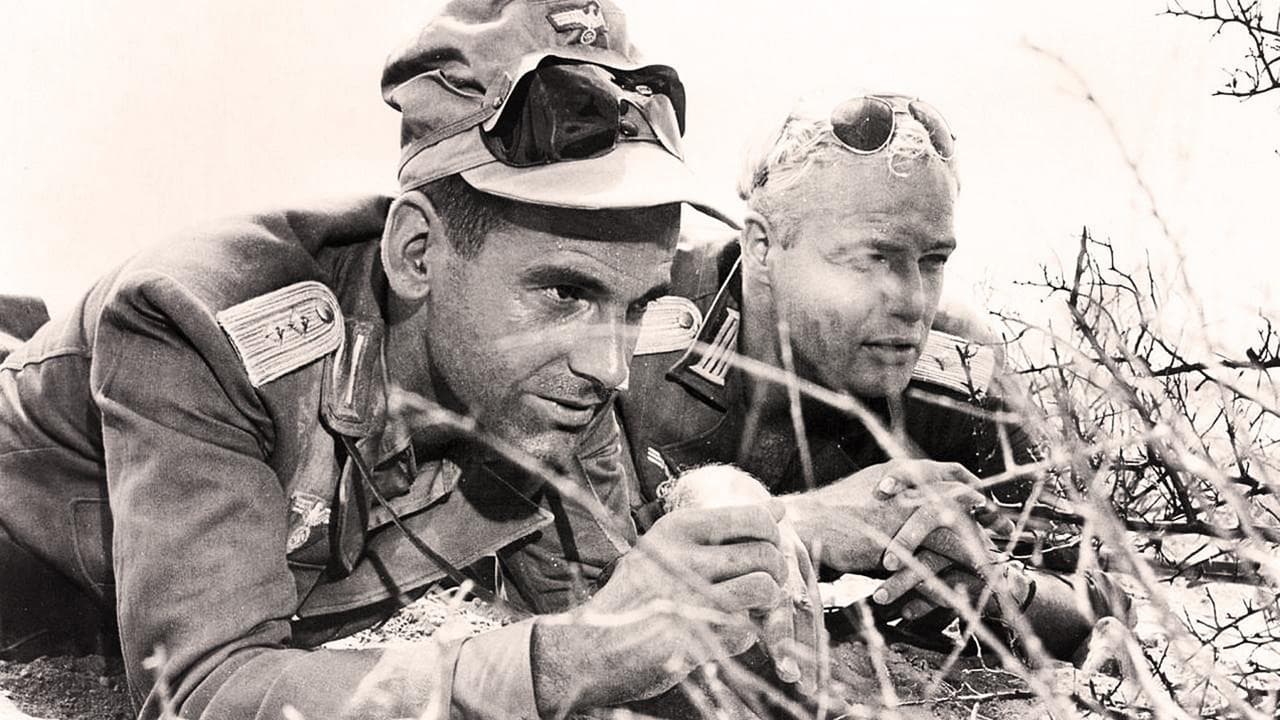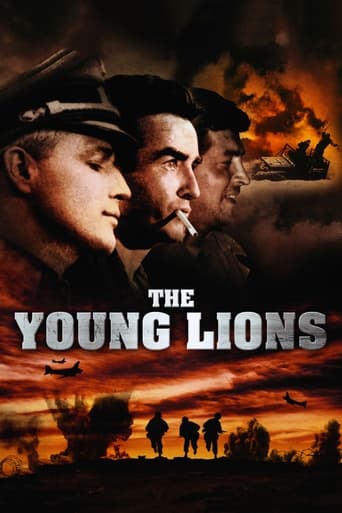

This is a pretty good movie, with two first rate actors (Brando and Clift), and if it hadn't been based on a first rate book by best-selling author Irwin Shaw, I'd have rated it a bit higher. I realize that a movie is not a book, but when a book has high merit and a distinctive character, and is then bowdlerized in typical Hollywood fashion, the resulting film cannot just be judged on its own merits.Shaw's book is considered one of the great WW2 novels (though many "elite" critics have characteristically dissed him because his books were popular), but it's more accurate to think of it as a book about anti-Semitism set in the context of America's war with Germany, than as simply a war novel. At the same time, The Young Lions is a long book, indeed, an epic, rich in both incident and observed detail, with many well realized episodes of combat and wartime crime, barbarity, and horror. It's a story of three young men of disparate backgrounds (ironically dubbed "young lions"), two Americans and one German, drawn together by fate, much like the characters in War and Peace, which this book resembles in many ways, though it has more focused themes.All three of these men are in their own way exceptional, and they rather epitomize than typify certain elements of the cultures they represent.The German, Christian Diestl, is meant, both in the book and the movie, to represent the mythic "good German". Diestl is good looking, attractive to women, and athletic (an expert skier and part time ski instructor), and he is reasonably well-mannered, well-educated, and cultured in the Germanic mode, though he is no intellectual. Diestl is also, however, somewhat naively politically active, and is in fact (in the book but not the movie) an avowed Nazi, but only after several years as a communist, and given Hitler's persecution of the communists in the 1930's there's more than a suggestion that Diestl has switched allegiances to survive.The American, Noah Ackerman (played by Montgomery Clift), is the typical, largely assimilated, second generation American Jew—not overtly religious, but introverted, intellectual, and subtly alien. In the book, he is called out to California to attend his dying father, a reprehensible man and a caricature of a refugee Eastern European Jew, for whom Noah feels only revulsion. After his father's death, he removes to NYC and obtains a low-level job there.Finally, the Michael Whitacre character (played by Dean Martin) is a middling journeyman in the artsy NY theatrical business, loosely married to a more successful movie actress, and generally at loose ends in his life, and already tending toward dissolution in his early 30's. He too is attracted to communism, or at least to a die-hard communist whom he meets at a NYC theatrical party, in town to raise money from the feckless show biz set for the Republican cause in Spain for which he fights. Michael's problem is that he has talent but no character, and nothing that he believes in very much, including himself. As a result of his anomie, he is doing what he can to evade the war, and the inevitable duty that he feels as a man and citizen, yet he's not really a coward, any more than the next man of imagination.If these thumbnails already seem a bit different from their opposite numbers in the movie—more complex and problematic—I am here to tell those who haven't read the book that their significant evolutions in the course Shaw's epic, through seven wartime years (horribly telescoped in the movie) are vastly different from the realizations of these characters in this rather routine Hollywood WW2 movie, despite the distinguished acting by Clift and Brando.I've hardly broached the deliberate sanitizing of the book's major theme, anti-Semitism, American as well as German, which is at most hinted at in the movie. For starters, Whitacre's half-hearted show business infatuation with communism, and Diestl's overt Naziism, and earlier communist background have been scrubbed from the movie by its Hollywood creators, who were at the time living through the HUAC and McCarthy era. Also, the overt American anti-Semitism that Noah encounters, the loathsome caricature of his dying Jewish father, etc. have all been meticulously expunged or retouched. I don't remember a single word or phrase suggestive of American anti-Semitism being uttered beyond the one time identification of Noah as a Jew.But the evisceration of one of the book's major themes, pervasive anti-Semitism, isn't the only unforgivable distortion. Shaw's novel has also been largely gutted of its character development. In the book, we have three young men of different backgrounds being sucked into a common war between their countries and cultures, but each is primarily fighting his own personal war: Noah, provoked by discrimination he encounters in the army, is intent on proving that he is a better man and soldier than those of his fellows who despise him as a Jew; Michael, to become a man in the larger senses of the word; and Diestl to measure up to his commanding officer, Lieutenant Hardenburg, a German superman.In the movie, Michael's only issue is to prove that he's not a coward; Noah that he's a regular American guy, despite his somewhat exotic and intellectual bent; and Diestl that he's still a decent person despite the horrors he has experienced as a dutiful German soldier. At the end of the movie, Diestl is ground down by war, but morally he has hardly evolved at all, yet in the book he slowly degenerates into a monster.The book is far darker and disturbing, but also more absorbing and rewarding, than the movie, as one becomes invested in each of these characters, their personal crises, and their ultimate fates, and for those who have a taste for old-fashioned adult fiction on the grand scale, my recommendation is to read the book and skip the movie.
... View MoreEdward Dmytryk directs this film version of Irwin Shaw's novel and it's not particularly good. That's a shame because at nearly 3-hours long, one would expect something beyond a well polished soap opera. It's the story of WWII told from both the American & German perspective. On the American side, there's Broadway entertainer Dean Martin and lost soul Montgomery Clift. On the German side, there's Marlon Brando as a disillusioned army captain. The film follows their trials and tribulations as well as their love lives. Brando plays his part like an actor afraid to go all out. His German is made into an idealistic saint. Clift, however, is a complete disaster. He's woefully miscast and about 10 years too old for his part. He's also clearly infirm, this being some of his first acting following his near catastrophic car accident in 1957. Martin comes off best, as he's playing a less comic version of his own persona. Dmytryk does a dis-service to the entire proceedings by relying heavily on war-time stock footage. The supporting cast is large and includes Lee Van Cleef, Hope Lange, Barbara Rush, Dora Doll (as Simone), and French chanteuse Liliane Montevecchi as Brando's strong-willed love interest. Maximilian Schell gives a fine performance as Brando's commanding officer. Hugo Friedhofer contributes a rousing score, but it's largely lost on this snail-paced epic.
... View MoreBased on the popular novel by Shaw, this film looks at the impact of WWII on three soldiers - two American and one German. It features fine performances from Brando and Clift - the only time the two Method actors worked together. Brando (dyed blonde) is a disillusioned German soldier. Clift, in a variation of his role in "From Here to Eternity," plays a sensitive Jew persecuted by fellow soldiers. Martin plays a cowardly soldier while Lange, Rush, and Britt provide the love interest. There are some superfluous scenes in the middle that could have been trimmed to reduce the running time of nearly three hours, but for the most part it does not drag.
... View MoreAfter the book I became very sad when I was watching the movie. I am agree that sometimes a film should be different from the original novel but in this case it was more than acceptable. Some examples:1) why the ranks are different (e.g. Lt. Diestl instead of Sergeant etc.)2) the final screen is very poor and makes Diestl as a soldier who feds up himself and wants to die. But it is not true in 100%. Just read the book. He was a bull-dog in the last seconds as well. He did not want to die by wrecking his gun and walking simply towards to Michael & Noah. So this is some kind of a happy end which does not fit at all for this movie.
... View More